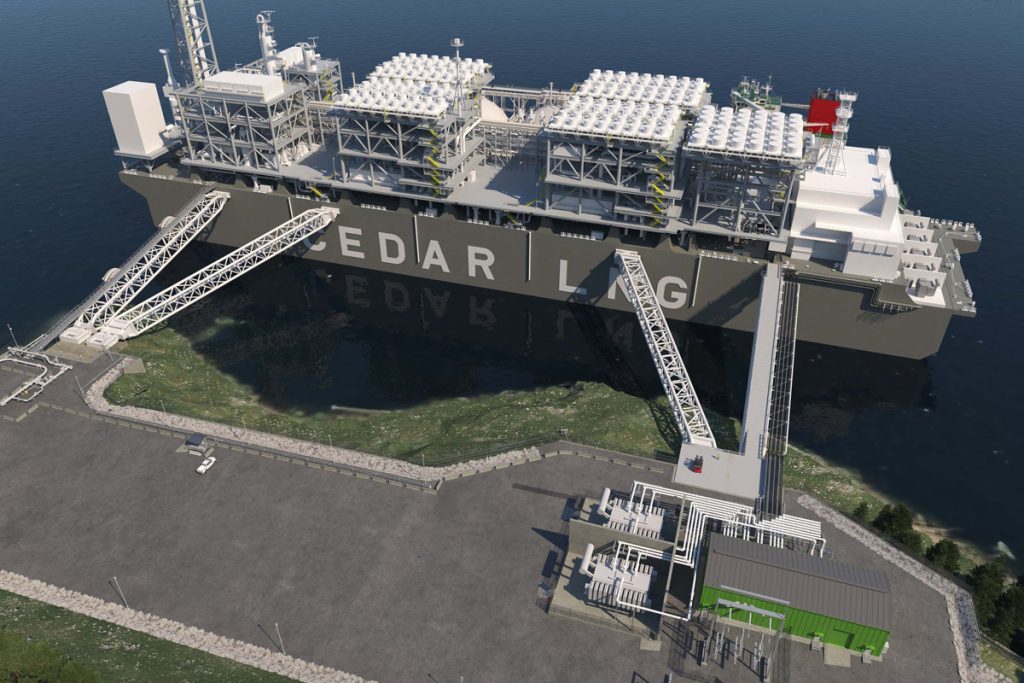Canada’s Pembina Pipeline and the Haisla Nation have taken a positive final investment decision on their $4 billion Cedar LNG project.
The partners announced FID in a statement released late on Tuesday.
The Haisla Nation has a 50.1 percent stake and Pembina owns 49.9 percent in the project which includes the construction of a floating LNG facility with a nameplate capacity of 3.3 million tonnes per annum (mtpa), located in the traditional territory of the Haisla Nation, on Canada’s West Coast.
In April, Cedar LNG issued a notice to proceed to Samsung Heavy Industries and Black & Veatch for Cedar LNG’s floating LNG production unit following the finalization of long-term commercial offtake agreements.
SHI is responsible for the hull of the FLNG and topside plant processes, while Black & Veatch will provide its PRICO technology.
Also, Baker Hughes has secured an order from Black & Veatch to supply the LNG project with electric driven liquefaction technologies, while Chart will provide natural gas liquefaction cold boxes and brazed aluminum heat exchangers.
The facility, which will be powered by renewable electricity from BC Hydro, is expected to be in service in late 2028.
Commercial deals
Cedar LNG has secured 20-year take-or-pay liquefaction tolling services agreements with ARC Resources and Pembina for 1.5 mtpa of LNG each.
Cedar LNG signed a 20-year take-or-pay fixed toll contract with compatriot ARC Resources.
As part of the agreement, ARC will supply Cedar LNG with about 200 million cubic feet per day of Canadian natural gas for liquefaction at the Cedar LNG facility.
Also, Pembina has executed an identical bridging agreement with Cedar LNG for 1.5 mtpa of capacity.
“Commercial discussions are continuing with multiple other prospective customers as Pembina intends to assign its contracted capacity to a third-party,” Cedar LNG said.
Under a long-term transportation agreement, the Cedar LNG facility will receive 400 million cubic feet per day of Canadian natural gas via TC Energy’s Coastal GasLink pipeline, which will supply LNG to Shell’s giant LNG Canada terminal.
Financing
The project has a total estimated cost of about $4 billion.
This includes estimated capital costs of about $3.4 billion, of which $2.3 billion, or about 70 percent, is under a fixed-price, lump-sum agreement, and $0.6 billion of interest during construction and transaction costs.
The project is expected to be funded with asset-level debt financing for about 60 percent of the project cost, according to the partners.
Cedar LNG has secured a construction term loan with a syndicate of banks.
Moreover, the remaining 40 percent of the costs of the project are expected to be financed through equity contributions from both partners.
The Haisla Nation have obtained committed capital through the First Nations Finance Authority to fund their 20 percent equity contribution to the project, while Pembina continues to anticipate its equity contribution will be funded from cash flow from operating activities.
Prior to FID, Pembina was required to provide financial assurances to advance project-related upstream infrastructure projects.
Following the positive FID, the required financial assurances will be transferred to Cedar LNG.
Cedar LNG has secured a letter of credit facility for the ongoing funding of the required financial assurances.
The project received “strong” support from domestic and international capital providers, the partners said.

